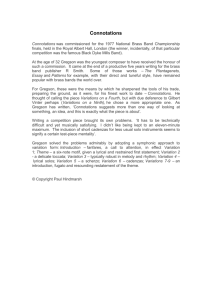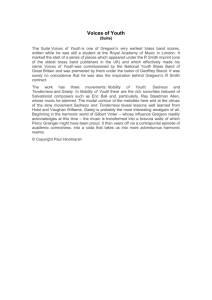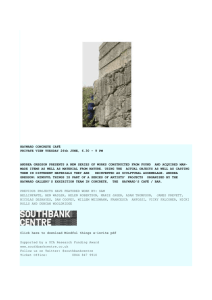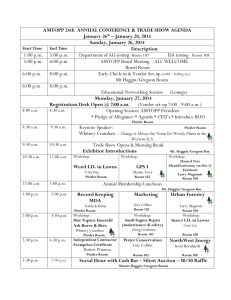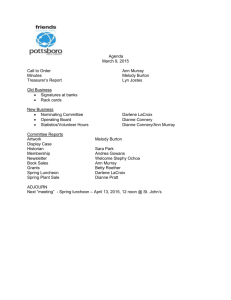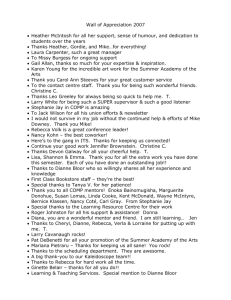FOREMOST DEPARTMENT STORES INC.
advertisement
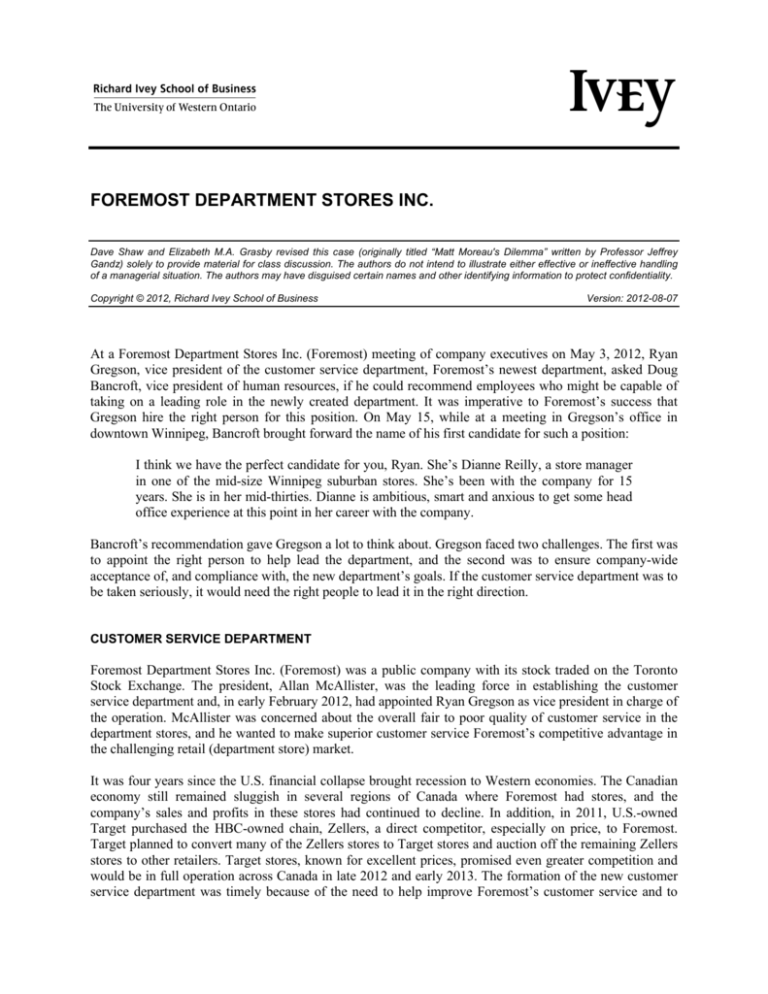
S w FOREMOST DEPARTMENT STORES INC. Dave Shaw and Elizabeth M.A. Grasby revised this case (originally titled “Matt Moreau's Dilemma” written by Professor Jeffrey Gandz) solely to provide material for class discussion. The authors do not intend to illustrate either effective or ineffective handling of a managerial situation. The authors may have disguised certain names and other identifying information to protect confidentiality. Copyright © 2012, Richard Ivey School of Business Version: 2012-08-07 At a Foremost Department Stores Inc. (Foremost) meeting of company executives on May 3, 2012, Ryan Gregson, vice president of the customer service department, Foremost’s newest department, asked Doug Bancroft, vice president of human resources, if he could recommend employees who might be capable of taking on a leading role in the newly created department. It was imperative to Foremost’s success that Gregson hire the right person for this position. On May 15, while at a meeting in Gregson’s office in downtown Winnipeg, Bancroft brought forward the name of his first candidate for such a position: I think we have the perfect candidate for you, Ryan. She’s Dianne Reilly, a store manager in one of the mid-size Winnipeg suburban stores. She’s been with the company for 15 years. She is in her mid-thirties. Dianne is ambitious, smart and anxious to get some head office experience at this point in her career with the company. Bancroft’s recommendation gave Gregson a lot to think about. Gregson faced two challenges. The first was to appoint the right person to help lead the department, and the second was to ensure company-wide acceptance of, and compliance with, the new department’s goals. If the customer service department was to be taken seriously, it would need the right people to lead it in the right direction. CUSTOMER SERVICE DEPARTMENT Foremost Department Stores Inc. (Foremost) was a public company with its stock traded on the Toronto Stock Exchange. The president, Allan McAllister, was the leading force in establishing the customer service department and, in early February 2012, had appointed Ryan Gregson as vice president in charge of the operation. McAllister was concerned about the overall fair to poor quality of customer service in the department stores, and he wanted to make superior customer service Foremost’s competitive advantage in the challenging retail (department store) market. It was four years since the U.S. financial collapse brought recession to Western economies. The Canadian economy still remained sluggish in several regions of Canada where Foremost had stores, and the company’s sales and profits in these stores had continued to decline. In addition, in 2011, U.S.-owned Target purchased the HBC-owned chain, Zellers, a direct competitor, especially on price, to Foremost. Target planned to convert many of the Zellers stores to Target stores and auction off the remaining Zellers stores to other retailers. Target stores, known for excellent prices, promised even greater competition and would be in full operation across Canada in late 2012 and early 2013. The formation of the new customer service department was timely because of the need to help improve Foremost’s customer service and to Page 2 give the business a competitive edge against Target. Since Foremost could not compete against Target solely on price, customer service was Foremost’s best hope, and it was imperative that all Foremost divisions and employees be on board. Gregson was appointed to head the customer service department on March 1, 2012; he spent the first two months studying what customer service involved and then presented a preliminary plan to Foremost’s executive committee, followed by a more concise version to the company’s board of directors. Gregson found that customer service extended well beyond the idea of being courteous and helpful to customers. He believed that, in order to improve the company’s customer service, Foremost would have to focus on improving several aspects and processes of its business. The plan included developing new programs that would have organization-wide impact on: Store location and department layout. Customer payment options. Website design and online sales. Staff training. Customer satisfaction measurements. Measuring and monitoring staff performance. Employee rewards for customer service. Superior customer service (including the cost of achieving this). In addition to defining the tasks involved in establishing and operating the department, Gregson was aware that Foremost’s operating departments faced a cost-cutting program that likely would mean a reduction of sales staff at the retail store level. Foremost operated under a functional organizational structure, which meant that the business was divided into departments that performed specific functions. While this was an appropriate structure for this organization, one of its disadvantages was that it could be difficult to get all departments to work towards the best interests of the organization as a whole, rather than to their own objectives and concerns. Gregson was also concerned that his department was a staff function — hopefully well-respected and influential, but with very little real power or authority. The retail stores were managed through a strong line operations department that reported to the vice president of sales, Tom Jansen, and the vice president of marketing, Jim Forsyth, who reported directly to the company president. While the company president made it clear at the executive committee meeting that the newly created customer service department was critical to Foremost’s success, Gregson knew that getting Jansen and Forsyth to buy into his recommendations would require leadership skills of the highest order. He would have to use power and influence to garner the respect and compromises needed from the other departments. He would also need the right people in place to lead properly. Great people in his department would not just be desirable, they would be critical! Gregson had to ensure that the customer service department was staffed with capable, influential and motivational leaders. To generate buy-in from Jansen and Forsyth, Gregson knew he would need to use one of several power strategies to gain their respect. He could use expert power by convincing the two men that he was well-equipped to determine what was in the best interest of the company. He could also choose to use legitimate power, as the appointed head of the customer service department. Finally, he could choose to use referent power, relying on his personality to develop an amicable relationship with both men. Gregson believed that the other two types of power, reward and coercive, would likely not prove effective: reward power was not within Gregson’s authority, and coercive power, relying on influencing through negative/punishment actions, would surely not sit well with his peers. Gregson would also have to use reason to convince Jansen and Forsyth of the need for the customer service department. Appointing a good Page 3 leader was one thing, but Gregson also had to ensure that the other departments in this functional structure were on board. DIANNE REILLY Gregson asked Bancroft to elaborate on Dianne Reilly’s credentials and her suitability for the position. Bancroft had Reilly’s file with him that afternoon and gave it to Gregson, but carried on the conversation with an elaborate description of Reilly’s background, experience with the company and personal information: Dianne joined Foremost in 1997 after two years with a leading retailer of women’s casual and sport clothes. We recruited her directly based on recommendations from one of our store managers who observed her performance selling a jacket to his wife. Prior to that, she graduated from a two-year community college program in Brandon, Manitoba with a diploma in retail sales management. In 2005, we enrolled Dianne in our management development program, one that required a special recommendation from her manager, where she was a class leader both in designing and undertaking new sales and marketing initiatives, in planning new ventures and in motivating people to buy into new ideas. Dianne was able to reason with her classmates, and she was well liked by them. Dianne has worked in several of our retail stores in increasingly important roles. In 2007, she worked closely with Tony Agostini, the divisional manager western region, to reverse the dismal performance of our large store at Northland Mall, and the results have been exceptional. Early in 2010, Tony promoted her to store manager, Downtown Centre, and she has already increased that store’s sales and profits on a month-over-month basis. Dianne’s performance appraisals from all her managers have been excellent with a special commendation from Tony Agostini. She currently is ranked “Very High Potential” on the company evaluation measuring system and earns close to the maximum salary for this position. She has indicated in her annual employee questionnaire that she would like to move to head office to broaden her experience and establish herself as a candidate for a senior executive position in the company. On the personal side, Dianne is 37 years old. She and her husband divorced six years ago. They have a 15-year-old daughter who lives with Dianne in a relatively small home near St. Charles Golf Club in the western suburbs of Winnipeg. Dianne is an avid tennis player, loves classical music and volunteers at the Wellspring House, a centre where people with cancer can get counselling and support. But, Ryan, I suggest that you talk with Tony before you contact Dianne. She reports to him and he is her biggest supporter. He will not be happy if he thinks you want to “steal her away” from his operation. Page 4 MEETING WITH TONY AGOSTINI The following day, Gregson called Tony Agostini and arranged to meet with him in his office in Saskatoon on Friday, May 18. Agostini spoke before Gregson could sit down for their meeting. The conversation went as follows: Agostini (rather heated): Ryan, I know why you are here. You want to move Dianne Reilly from our Winnipeg Downtown store into your new department. I knew Doug Bancroft was looking at moving her. She is the best store manager I have in Western Region, and here you and Bancroft, without any sales and profit targets that you have to hit, want to take my best performer in the field — where it really counts — and move her into that black hole of a head office where she won’t add a nickel to the bottom line! Gregson: Tony, Dianne indicated on her last employee questionnaire that she wanted a stint at head office to extend her experience at Foremost and to make her a strong candidate for a senior executive position. You should know that Allan’s commitment to customer service is fervent and that we face some very serious challenges in developing and implementing programs to accomplish the president’s goals. We are up against some pretty tough competition with Target’s recent acquisition and expansion, making customer service more important than ever. Dianne will not be lost in head office obscurity. She will be out in the field much of the time working with store managers and sales staff across the country to improve their performance with customers. This is a high stress job, visible to everyone in management at Foremost, and it demands the best people we can recruit for the job. If we do not have the right people in place, this will adversely affect all other departments, including yours. Dianne Reilly looks like a perfect fit for this task. Agostini (somewhat cooler): How much do you know about Dianne Reilly’s personal circumstances? Gregson: I have reviewed her file extensively and have read her performance appraisals. She appears to have a lot of strengths with no weaknesses that I know of to date. I do know that in 2005 she had an extended leave of absence of 10 weeks, apparently for medical reasons, and I presume it was solved because there is no further mention of it. Agostini (speaking somewhat reluctantly): There’s more. And not many people know about it. Dianne’s problem in 2005 was that she had cancer of the lymph glands and was under doctor’s care for almost two months. She went for chemotherapy, undertook some other strong medication and worked with therapists to recover from the disease’s devastating effects and the treatment. Every year, she has a series of tests and other procedures that leave her weak and looking like the “walking dead” for a few days afterwards. The cancer is apparently in remission. She has bounced back from the worst of it in great shape, and she delivers wonderful results both in store sales and sales staff development. I am worried that the extra work and very high stress you refer to in describing this new position could bring back her medical problems. If it did, you’d never know it. Dianne is just one of those people who always looks cheerful, never lets on that anything is wrong. But Dianne is not used to the upset of travel, of being away from her daughter at home and of working long hours on the road. Page 5 If you decide to offer her the job, even after you have explained all the challenges and difficulties that come with it, I’m sure she will accept it. She has coped with the cancer by pushing herself hard — to her limit — and then some. She would see this as a great challenge and opportunity. But ask yourself, is it really worth it? What if she takes the job and her health deteriorates? Can you afford to have a senior manager in your department with a serious medical problem? It’s not like you’re running a store where you can get someone else to fill in when a manager or employee is off ill. You know that cancer can recur any time. RYAN GREGSON’S DILEMMA On the flight back from Saskatoon to Winnipeg, Gregson thought long and hard about this situation. What options did he have? Should he even speak to Dianne Reilly about the position? If she was as good as everyone said and his interview with her confirmed that assessment, should he let her make the decision after he explained to her how much pressure and stress was associated with the position? If she accepted the position and then her health deteriorated, how would he explain his decision, no matter what it was, to Tony Agostini, Doug Bancroft and Allan McAllister, let alone to himself? Would not hiring Reilly be viewed as a form of discrimination because of her illness? Regardless of the ethical dilemma confronting him, Gregson needed to make a decision about Reilly early next week.
